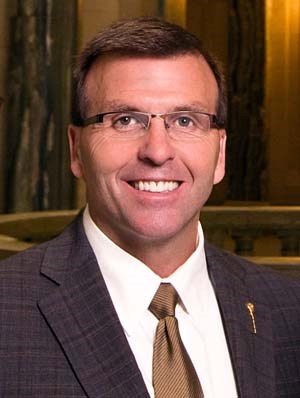This is the last New Year before the next provincial election, and Yorkton MLA and Minister for Rural and Remote Health Greg Ottenbreit says that defined what the government had set out to do in 2015. It was a year to finish off the mandate from 2011 and prepare for the next provincial election on April 4.
The year was also defined by a focus on the economy, Ottenbreit says, specifically trying to find ways to diversify so the province is less reliant on one aspect of the economy for its revenues. He admits that the dramatic decline in oil prices has been a hit to the province, but that means they have to focus on keeping the rest of the economy strong.
“Whether it’s strengthening our economy through expanded markets, through our natural resources, through our agricultural products, making sure we have a competitive tax environment, making sure we have an environment that’s really attractive for investment, is a lot of what we have been doing over the past number of years, but specifically the past year.”
Still, a hit is a hit, and the province is running a deficit in 2015, reporting a $262 million deficit last quarter. He admits that this has lead to “finding efficiencies” in the various ministries, including his own in Rural and Remote Health.
In his own portfolio, Ottenbreit says that the focus has been on building, whether literally, with new facilities across the province, or figuratively, bringing in staff in traditionally hard to fill roles in rural areas. Ottenbreit says that boosts to training seats have paid off in 2015, as well as changes to international recruitment through SIPPA. Between a higher rate of retention, more doctors passing the SIPPA programs, and more training in rural centres, Ottenbreit says many long-term projects are paying off.
“Virtually every Friday I have been opening a new facility, either a long term care facility, an emergency centre, a clinic... We’ve seen a lot of successes on the infrastructure side but also a lot of success on the employment side... We’re able to fill those very important spots in rural areas, like in Preeceville and across the province.”
Locally the provincial government has also come under fire for changing the way some services are delivered, especially after the closure and privatization of laundry services, which also hit Yorkton. Ottenbreit believes that if healthcare is to be sustainable, things have to be done differently.
“We have to look at these things with an open mind, consider what’s the best way to serve the people of the province. When we look at health, should health be focused on laundry or should health be focused on health? In the facilities that are closing in the province, there’s a $30 million investment needed to retrofit or rebuild these facilities, and an additional $9 million a year plus to operate them as opposed to the system we are going to, with the one centralized laundry in Regina. It’s a decision we made, and I believe it is the right decision.”
He also believes the lean system in health is paying off, even if there were doubts raised in the recent auditor’s report about how successful the program is. Ottenbreit says that what he has seen has convinced him lean will work once it’s fully rolled out.
“It’s going to be a bit of a culture change to get it accepted by everybody in the health system, but I really do believe that if we’re going to have a sustainable health system for decades into the future, that’s an area we have to go to.”
The most visible project to see completion in this riding was the Parkland College’s Trades and Technology Centre, a project that Ottenbreit has championed on the provincial level since it was proposed. He emphasizes that it’s the community support that sold the project on the provincial level and made it something that the province could feel confident was a good investment, including the successful capital campaign.
While it has not been a perfect four years, especially with large drops in resource revenue, Ottenbreit believes that they have ended their mandate on a strong note, and coming into the next election, he thinks they can stand on their record.
“Barring a couple things that we weren’t able to follow through with due to economic pressures, I think we’ve got a strong record going into this next provincial election, compared to the alternative.”




